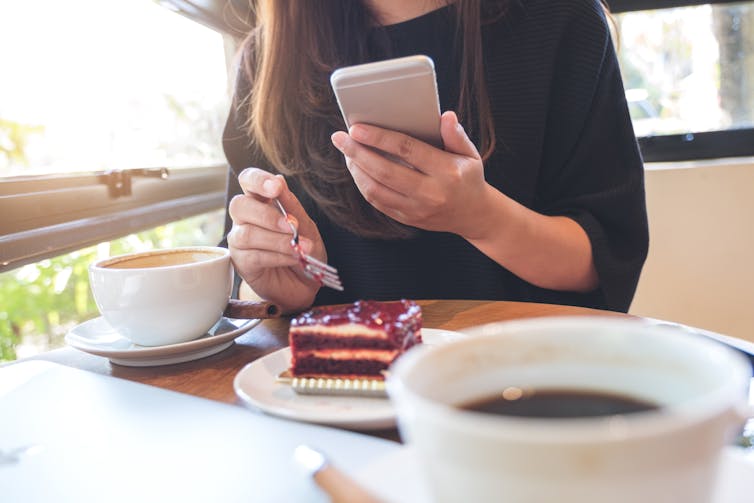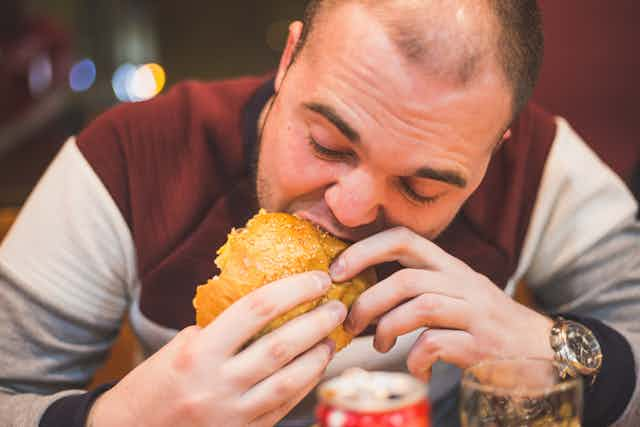We tend to think that we stop eating when our stomachs are full. Science shows otherwise. Here are five reasons we often overeat without realising it.
1. Portion size
Visual aspects of a meal, such as portion size, have been shown to influence how much we eat. In an American study on satiety, participants were seated at a table and instructed to eat soup. Half of the bowls were slowly and imperceptibly refilled, via a tube beneath the table, as their contents were consumed. The participants whose bowls were covertly refilled consumed 73% more soup than those who refilled the bowls themselves, but they didn’t believe they had consumed more, nor did they feel more full than those eating from normal bowls.
It’s unlikely that someone is secretly refilling your bowl under the table, but it’s important to be aware that you are likely to eat however much food is on your plate.
2. Variety
Usually, when eating, we get used to the taste of the food, which means we get less pleasure from it and so stop eating. This effect is called “sensory-specific satiety”. It essentially means we get full for that specific taste. However, when we eat a varied plate of food, switching between the foods continues to renew their palatability.
When researchers tested this effect, they found people ate four times as much when given multiple different foods. The sensory-specific satiety effect tends to be enhanced the more different the foods are to each other. This variety means you will enjoy the food for longer and keep the feeling of being full at bay.
Although nutritional advice suggests a varied diet for good health, you should be wary of situations that result in lots of different food items on your plate at the same time, such as buffet meals.
3. Distraction
People often eat while doing other things, such as watching TV, working or catching up on social media. But eating while distracted interferes with mechanisms that normally stop an eating session, such as liking a food less after consuming a certain amount of it, meaning that it will take longer to feel full. Also, when distracted you are less aware of becoming full and so need to consume more food to reduce hunger.
You’ve probably already heard that eating while distracted tends to increase intake, but what you might not know is that this effect continues throughout the day. Distraction can disrupt both your awareness of fullness when eating and your memory of the food eaten, which makes you more likely to eat more later in the day.

4. Alcohol
Alcohol increases the likelihood of overeating for several reasons, including reduced self-control and increased impulsivity. It can even make food tastier. Recent research suggests it may also disrupt your ability to monitor your body’s signals, so-called interoception.
Interoception can be measured by a heartbeat tracking task. People who are better at this task are more likely to be a healthy weight and have healthy eating habits. Just two alcoholic drinks significantly decreases a person’s ability to track their own heartbeat on this task.
5. Eating with others
Eating a meal with other people increases the amount you are likely to eat. The foods you choose to eat are also likely to be influenced – you are more likely to choose similar food to those around you.
This effect is enhanced when we have close relationships with the people we are eating with as we feel a stronger need to identify with them. This is primarily a social effect, where we use others’ eating behaviour as a guide for our own. However, recent research suggests this phenomenon may also affect your experience of eating. If people you identify with are enjoying a particular food, it suggests to you that the food will taste good. Expecting a food to taste good increases how much it is liked which in turn increases the amount eaten.
So, what can we do to combat overeating if we are not aware of it. Research shows that eating attentively (focusing on the food without any distractions) reduces current and subsequent intake by increasing awareness and memory for the food eaten. Other research has shown that a smartphone-based attentive eating app, which involved photographing, answering questions and being reminded about food consumed, can help with weight loss. So, even when it is not possible to eat attentively at the time of eating, it might still be worth taking a photo of your food to avoid overeating throughout the day.

